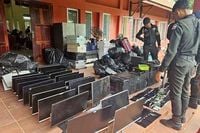In a sweeping crackdown that has gripped Cambodia over the past month, authorities have detained more than 2,000 suspects involved in online scam operations, a significant portion of whom are foreign nationals from Southeast and South Asia. This surge in arrests, driven by a directive from Prime Minister Hun Manet, aims to dismantle the sprawling cybercrime networks that have tarnished Cambodia's reputation and inflicted widespread harm on victims worldwide.
According to Cambodian Information Minister Neth Pheaktra, the intensified campaign against online scam centers has resulted in the detention of at least 2,137 suspects since June 27, 2025. These arrests spanned 43 locations across the country, including provinces such as Kandal and Stung Treng, with raids uncovering major scam hubs operating with impunity. The crackdown is ongoing, with authorities determined to root out illegal cybercrime activity regardless of the perpetrators' affiliations or locations within Cambodia.
The detainees represent a diverse group of nationalities, highlighting the transnational nature of these criminal enterprises. Among those arrested are 429 Vietnamese, 271 Indonesians, 589 Chinese, 57 Koreans, 70 Bangladeshi, and 42 Pakistanis, alongside suspects from Thailand, Laos, India, Nepal, the Philippines, and Myanmar. This multinational presence underscores how Cambodia has become a magnet for cybercrime syndicates exploiting lax enforcement and porous borders.
One particularly notable raid occurred on the evening of July 18, 2025, at the XAMAT Casino near the Cambodian-Vietnam border in Tboung Khmum Province. Provincial authorities, led by Governor Pen Kosal and coordinated with the local prosecutor, uncovered a staggering 448 employees engaged in online scam activities within the casino premises. Among them were 350 Vietnamese nationals, including 104 women, and 98 Cambodian nationals, 40 of whom were female. Materials used to perpetrate scams were also seized. Following the raid, all detainees underwent interrogation and drug testing as part of ongoing investigations.
The scale of Cambodia's cybercrime problem is staggering. The United Nations has described Southeast Asia as the "ground zero" for cybercrime centers, estimating that these operations defraud web users of approximately US$40 billion annually. Victims are often targeted through elaborate schemes involving romance scams or fraudulent business opportunities, with perpetrators exploiting the anonymity and reach of the internet to ensnare individuals worldwide.
Prime Minister Hun Manet has been unequivocal in his stance against these operations. Earlier in July, he issued a directive mandating law enforcement and military personnel to intensify efforts against online scam centers, warning that failure to act decisively would result in transfers or dismissal. This top-down mandate has galvanized a series of coordinated raids and investigations across nine of Cambodia's 25 provinces, signaling a sustained commitment to eradicating these illicit networks.
Despite the government's efforts, the problem is deeply entrenched and complicated by human trafficking and forced labor. Most online scam centers are operated by foreign syndicates, often linked to human trafficking rings that lure vulnerable job seekers with promises of lucrative employment, only to trap them in exploitative conditions. Amnesty International's report released in June 2025 sheds light on the grim realities within these compounds, revealing at least 53 scam centers in Cambodia where victims endure forced labor, child labor, torture, deprivation of liberty, and even slavery.
Amnesty International highlighted that many workers are recruited under false pretenses and held captive in "hellish labour camps," coerced to commit fraud under threats of violence. Furthermore, the organization pointed to troubling allegations of collusion between some Chinese compound bosses and Cambodian police, which has hindered efforts to shut down these compounds despite widespread abuses.
These revelations have drawn international attention and criticism. The United Nations and various human rights groups have called for stronger regional cooperation to combat the transnational nature of cybercrime and human trafficking. Neighboring countries such as Laos and Myanmar have also intensified their crackdowns, with Myanmar's Information Ministry reporting the arrest of approximately 9,000 foreign nationals involved in online gambling and internet scams between January and May 2025.
Within Cambodia, the justice ministry has taken steps to address internal challenges, including suspending a prosecutor pending investigation after allegations surfaced that he released several cybercrime suspects prematurely. Meanwhile, prosecutions are underway against some ringleaders, while most foreign nationals detained are being deported. For instance, in March 2025, Cambodian authorities deported 119 Thai nationals among 230 foreign detainees following raids in Poipet city.
The crackdown has also brought to light the gendered dimensions of this crisis. Approximately 20 percent of the suspects arrested in recent operations are women from developing countries such as Bangladesh, China, Indonesia, Pakistan, and Vietnam. In one operation alone, 27 Bangladeshi women were detained. Shyamoli Mazumder, Chief Executive of the Organisation for Women Development in Bangladesh, explained from Dhaka that many women take risky overseas jobs due to poverty and limited employment opportunities at home, often lacking adequate protections.
Locally, human rights organizations have welcomed the government's intensified actions but stress that more needs to be done to protect victims and dismantle criminal networks. Am Sam Ath, Operations Director of Cambodian NGO Licadho, emphasized that the campaign against online fraud should have started much earlier, noting how cybercrime has damaged Cambodia's international image, tourism, investment climate, and social stability. He also highlighted that other ASEAN members have taken similar steps this year to suppress online crime.
As Cambodia continues its crackdown, the challenge remains daunting. The sophisticated and well-organized nature of these syndicates, coupled with the involvement of multiple nationalities and the overlay of human trafficking, requires sustained regional cooperation and robust enforcement. Yet, the government's recent actions, backed by strong political will and international support, signal a turning point in the fight against the cybercrime epidemic that has long plagued Cambodia and its neighbors.
For many victims, the hope is that these efforts will bring justice and prevent others from falling prey to the deceptive allure of online scams. For Cambodia, the stakes are high—not only in restoring its reputation but in safeguarding the welfare and dignity of thousands caught in this web of deceit and exploitation.

